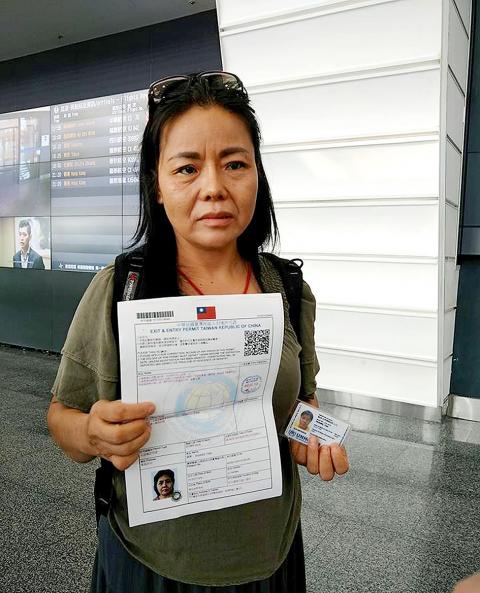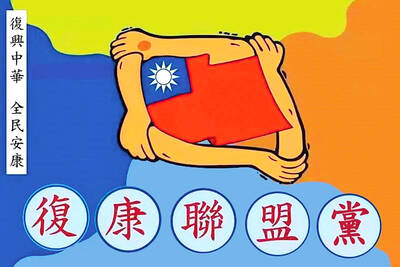The Ministry of Foreign Affairs yesterday said it would offer assistance to a Chinese human rights activist seeking political asylum who has been allowed into Taiwan for a three-month stay.
The Mainland Affairs Council late on Wednesday confirmed a report by online newspaper Hong Kong Free Press, which said that Huang Yan (黃燕), who has been granted refugee status by the UN, arrived at Taiwan Taoyuan International Airport at 8:40pm on Tuesday from Jakarta.
Huang has been subject to detentions, house arrest and brutality at the hands of state agents due to her involvement in campaigns demanding freedom for activists and lawyers detained in China, the newspaper said.

Photo courtesy of Taiwan Association for China Human Rights
Due to Taiwan’s lack of a refugee law, Huang had to remain at the airport and was facing deportation to China, where she faces persecution, until authorities decided to grant her temporary protection, the newspaper said.
Council spokesman Chiu Chui-cheng (邱垂正) confirmed the report, saying that the government approved Huang’s stay due to considerations that she could face persecution if returned to China.
The National Immigration Agency’s joint review committee examined her case and, taking into account her UN status as a refugee and the danger she could face in China, granted her a three-month stay, Chiu said.
Once the temporary stay period concludes, Huang would have to resettle in another nation, he added.
Asked to comment on Taiwan Association for China Human Rights chairman Yang Hsien-hung’s (楊憲宏) suggestion that the government report Huang’s location to the UN, ministry spokesman Andrew Lee (李憲章) told a morning news conference that Huang’s entry into Taiwan is a matter overseen by the agency, while the council is responsible for affairs related to Chinese citizens.
“That said, should [Huang] require the assistance of the ministry or our overseas representative offices in the future, we will provide it accordingly,” Lee said, adding that the ministry has yet to receive such a request.
The case came amid tension across the Taiwan Strait that has continued to rise following Beijing’s continued efforts to poach Taiwan’s diplomatic allies and limit the nation’s international presence.
Burkina Faso on Thursday last week became the fourth nation since President Tsai Ing-wen (蔡英文) took office in May 2016 to sever ties with Taiwan — likely due to financial incentives from China — after Sao Tome and Principe in December 2016, Panama in June last year and the Dominican Republic last month.
China has also blocked Taiwan from receiving an invitation to the World Health Assembly for two consecutive years.
As a countermeasure, the council announced that it would tighten its screening of applications by Chinese officials to visit Taiwan.
Additional reporting by staff writer

AIR DEFENSE: The Norwegian missile system has proved highly effective in Ukraine in its war against Russia, and the US has recommended it for Taiwan, an expert said The Norwegian Advanced Surface-to-Air Missile Systems (NASAMS) Taiwan ordered from the US would be installed in strategically important positions in Taipei and New Taipei City to guard the region, the Ministry of National Defense said in statement yesterday. The air defense system would be deployed in Taipei’s Songshan District (松山) and New Taipei City’s Tamsui District (淡水), the ministry said, adding that the systems could be delivered as soon as the end of this year. The US Defense Security Cooperation Agency has previously said that three NASAMS would be sold to Taiwan. The weapons are part of the 17th US arms sale to

SERIOUS ALLEGATIONS: The suspects formed spy networks and paramilitary groups to kill government officials during a possible Chinese invasion, prosecutors said Prosecutors have indicted seven retired military officers, members of the Rehabilitation Alliance Party, for allegedly obtaining funds from China, and forming paramilitary groups and assassination squads in Taiwan to collaborate with Chinese troops in a possible war. The suspects contravened the National Security Act (國家安全法) by taking photos and drawing maps of key radar stations, missile installations and the American Institute in Taiwan’s headquarters in Taipei, prosecutors said. They allegedly prepared to collaborate with China during a possible invasion of Taiwan, prosecutors said. Retired military officer Chu Hung-i (屈宏義), 62, a Republic of China Army Academy graduate, went to China

INSURRECTION: The NSB said it found evidence the CCP was seeking snipers in Taiwan to target members of the military and foreign organizations in the event of an invasion The number of Chinese spies prosecuted in Taiwan has grown threefold over a four-year period, the National Security Bureau (NSB) said in a report released yesterday. In 2021 and 2022, 16 and 10 spies were prosecuted respectively, but that number grew to 64 last year, it said, adding that the Chinese Communist Party (CCP) was working with gangs in Taiwan to develop a network of armed spies. Spies in Taiwan have on behalf of the CCP used a variety of channels and methods to infiltrate all sectors of the country, and recruited Taiwanese to cooperate in developing organizations and obtaining sensitive information

BREAKTHROUGH: The US is making chips on par in yield and quality with Taiwan, despite people saying that it could not happen, the official said Taiwan Semiconductor Manufacturing Co (TSMC, 台積電) has begun producing advanced 4-nanometer (nm) chips for US customers in Arizona, US Secretary of Commerce Gina Raimondo said, a milestone in the semiconductor efforts of the administration of US President Joe Biden. In November last year, the commerce department finalized a US$6.6 billion grant to TSMC’s US unit for semiconductor production in Phoenix, Arizona. “For the first time ever in our country’s history, we are making leading edge 4-nanometer chips on American soil, American workers — on par in yield and quality with Taiwan,” Raimondo said, adding that production had begun in recent